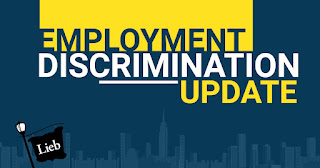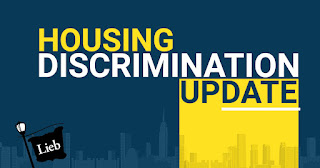On August 23, 2023, Gov Hochul signed A7355 and added protections for gender identity or expression to the New York State Human Rights Law (Executive Law 296-c) with respect to unpaid interns.
Thursday, August 24, 2023
Wednesday, December 28, 2022
Major Discrimination Update - NYS Human Rights Law Expanded to Prohibit Discrimination on Citizenship / Immigration Status
Monday, November 28, 2022
Court - Discrimination Statute of Limitations Friction between NYS Human Rights Law & EEOC Right to Sue
In New York State and under the New York State Human Rights Law, a discrimination lawsuit generally must be commenced within three-years of the wrong complained of for the lawsuit to be timely and actionable.
However, a federal employment discrimination case must be filed with the Equal Employment Opportunity Commission (EEOC) within 300 days of the wrong for a federal claim, under Title VII, to be actionable. Yet, no federal lawsuit can be filed until the EEOC issues a right to sue letter.
So, what happens when an employee wants to file both a federal and state claim? Specifically, what happens if the right to sue letter isn't issued until after the expiration of the three-year New York State deadline?
The Appellate Division, First Department, just answered that question in Gabin v Greenwich House, Inc.
The court ruled that NYS Administrative Code section 8-502(d) tolls (a/k/a, freezes) the counting of the three-year period under state law during the period from when a charge is first filed with the EEOC until the right to sue letter is issued.
Thursday, March 17, 2022
Notice of Tenants' Rights to Reasonable Modifications and Accommodations for Persons with Disabilities
On March 16, 2022, the NYS Division of Human Rights published Revised Rule Making, HRT-15-21-00005-RP (proposed 19 NYCRR 466.15), with respect to the notice that tenants must receive, which explains their rights to receive reasonable modifications and accommodations in housing.
The proposed regulation provides that:
- Real Estate Brokers are charged with making this disclosure "[u]pon the first substantive contact."
- Housing providers are charged with providing this disclosure to current and new tenants.
- Housing providers must post the notice on all of their websites.
Here is what the notice should state:
NOTICE DISCLOSING TENANTS’ RIGHTS TO REASONABLE ACCOMMODATIONS FOR PERSONS WITH DISABILITIES
Reasonable Accommodations
The New York State Human Rights Law requires housing providers to make reasonable accommodations or modifications to a building or living space to meet the needs of people with disabilities.
For example, if you have a physical, mental, or medical impairment, you can ask your housing provider to make the common areas of your building accessible, or to change certain policies to meet your needs.
To request a reasonable accommodation, you should contact your property manager by calling —or —, or by e-mailing — * . You will need to inform your housing provider that you have a disability or health problem that interferes with your use of housing, and that your request for accommodation may be necessary to provide you equal access and opportunity to use and enjoy your housing or the amenities and services normally offered by your housing provider.
A housing provider may request medical information, when necessary to support that there is a covered disability and that the need for the accommodation is disability related.
If you believe that you have been denied a reasonable accommodation for your disability, or that you were denied housing or retaliated against because you requested a reasonable accommodation, you can file a complaint with the New York State Division of Human Rights as described at the end of this notice.
Specifically, if you have a physical, mental, or medical impairment, you can request:
- Permission to change the interior of your housing unit to make it accessible (however, you are required to pay for these modifications, and in the case of a rental your housing provider may require that you restore the unit to its original condition when you move out);
- Changes to your housing provider’s rules, policies, practices, or services;
- Changes to common areas of the building so you have an equal opportunity to use the building. The New York State Human Rights Law requires housing providers to pay for reasonable modifications to common use areas.
Examples of reasonable modifications and accommodations that may be requested under the New York State Human Rights Law include:
- If you have a mobility impairment, your housing provider may be required to provide you with a ramp or other reasonable means to permit you to enter and exit the building.
- If your healthcare provider provides documentation that having an animal will assist with your disability, you should be permitted to have the animal in your home despite a “no pet” rule.
- If you need grab bars in your bathroom, you can request permission to install them at your own expense.
- If your housing was built for first occupancy after March 13, 1991 and the walls need to be reinforced for grab bars, your housing provider must pay for that to be done.
- If you have an impairment that requires a parking space close to your unit, you can request your housing provider to provide you with that parking space, or place you at the top of a waiting list if no adjacent spot is available.
- If you have a visual impairment and require printed notices in an alternative format such as large print font, or need notices to be made available to you electronically, you can request that accommodation from your landlord.
Required Accessibility Standards All buildings constructed for use after March 13, 1991, are required to meet the following standards:
- Public and common areas must be readily accessible to and usable by persons with disabilities;
- All doors must be sufficiently wide to allow passage by persons in wheelchairs; and
- All multi-family buildings must contain accessible passageways, fixtures, outlets, thermostats, bathrooms, and kitchens.
If you believe that your building does not meet the required accessibility standards, you can file a complaint with the New York State Division of Human Rights.
How to File a Complaint A complaint must be filed with the Division within one year of the alleged discriminatory act. You can find more information on your rights, and on the procedures for filing a complaint, by going to www.dhr.ny.gov, or by calling 1-888-392-3644 with questions about your rights. You can obtain a complaint form on the website, or one can be e-mailed or mailed to you. You can also call or e-mail a Division regional office. The regional offices are listed on the website.
The public can comment on this Revised Rule Making until April 30, 2022 by email to Caroline.Downey@dhr.ny.gov with subject of I.D. No. HRT-15-21-00005-RP
- Includes a posting requirement;
- Language change from "doctor" to "healthcare provider" with respect to proving disabilities;
- Language change from "show" a disability to "inform" of a disability;
- The regulation also now explains the statute of limitations of 3 years to file a complaint in court;
- Adding that the failure of a housing provider to respond to a reasonable accommodation request may also be considered a denial of a reasonable accommodation;
- Clarifying when a provider may reasonably request particular documentation about a disability or need for an accommodation; and
- That the notice requires owners and landlords, not real estate agents, to provide contact information for property managers in the notice.




